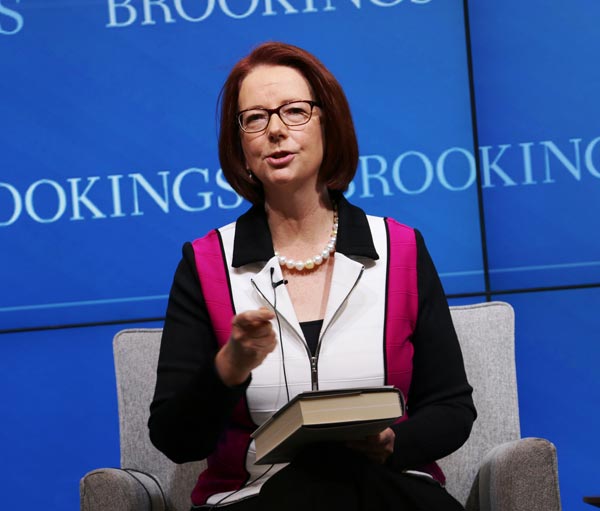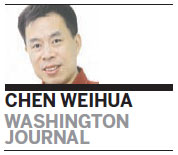|
||||||||
 |
|
Former Australian Prime Minister Julia Gillard talks about her new book "My Story" at the Brookings Institution in Washington on Monday. |
 Former Australian Prime Minister Julia Gillard once said that foreign policy is not her passion.
Former Australian Prime Minister Julia Gillard once said that foreign policy is not her passion.
"You know, I came into politics predominantly to make a difference, particularly to make a difference in education," she said in 2010 when she became the first female prime minister in Australia.
On Monday at the Brookings Institution in Washington, Gillard expressed optimism that Australia would maintain good ties with both China and the United States, which are often seen as rivals for influence in the region.
Australia has a longstanding security alliance with the US that drew special attention in China when Gillard hosted US President Barack Obama in November 2011. During that trip, Obama announced that the US would send more marines to a military base in Darwin in Australia's Northern Territory.
Current Australian Prime Minister Tony Abbott struck a defense agreement with Obama during his visit to the US in June to lay the groundwork for more US troops, aircraft and ships at Australian bases.
Gillard, who has been a nonresident senior fellow at Brookings since October 2013 (less than four months after she stepped down as prime minister) said that it's possible for Australia to improve its relationship with the US and China at the same time.
"It isn't some zero-sum game that you can only improve the relationship with one at the cost of the relationship with the other," Gillard said at the launch for her book, My Story.
While much of the book focuses on Australian politics, her three-year and three-day experience as prime minister and her ideal and fight for a better Australian society, it also addresses strategic shifts in the Asia-Pacific region, particularly the rise of China, both economically and strategically.
Gillard, 53, touted the deal she struck with Chinese leaders in April last year to have an annual dialogue with Chinese Premier Li Keqiang and other senior government officials. She said it improved Australia's access to China's top decision-makers. Australia is one of only a handful of nations with that access; the others are the US, Russia, Britain and Germany.
As a result of the deal, Abbott and several of his ministers visited Beijing in April this year, meeting President Xi Jinping, Li and other senior government officials in a bid to strengthen bilateral relations.
China is by far Australia's largest trading partner, as trade surpassed $150 billion last year; Japan and the US follow.
Australia was much less affected by the global financial crisis since 2008, largely due to its strong trade with China. US trade with Australia is only about a third of that between China and Australia.
China and Australia have been negotiating a free-trade agreement since 2005, with the 21st round of talks held in Beijing last month.Many expect an agreement to be struck during Xi's visit to Australia for the G20 summit in November, but a deal is uncertain. Differences over mining and agriculture remain.
As a witness to the US "pivot" to Asia, Gillard said she doesn't doubt that the US seeks to deeply engage Asia, but countries there are unsure if Washington has the ability to see it through.
That observation arose after Obama didn't attend the APEC and East Asia Summit a year ago due to the partial shutdown of the US federal government.
While Australia is often seen as being caught in the strategic distrust between China and the US, the three countries for the first time held a joint military exercise in Australia Oct 7-25.
Known as Exercise KOWARI, the drill involved 10 participants from each country. It included field-training and survival tests in remote inland and coastal areas. Australian Defense Minister David Johnston said it provided a template for regional defense cooperation into the future.
The three nations also took part in the Rim of the Pacific naval exercise (RIMPAC) this summer. It was the first time China participated in the22-nation drill.
Observers expressed that a continued strategic rivalry between China and the US for regional influence will make it hard for nations in the region to keep a balance of their relations with the two powers. Many hope that Xi and Obama help reduce that concern when they meet in Beijing in November during and after the APEC summit in Beijing.
Contact the writer at chenweihua@chinadailyusa.com

 Music at her fingers
Music at her fingers
 Across America Over the Week (Jan 16 - Jan 22)
Across America Over the Week (Jan 16 - Jan 22)
 Spend Chinese New Year in style
Spend Chinese New Year in style
 Ili river valley becomes a popular destination for swans
Ili river valley becomes a popular destination for swans
 Philip Ma: from scientist to businessman
Philip Ma: from scientist to businessman
 Birmingham's Spotlight on China dinner
Birmingham's Spotlight on China dinner
 How to distinguish doucai, wucai, Famille-rose and enamel porcelain
How to distinguish doucai, wucai, Famille-rose and enamel porcelain
 Xinjiang lake in bumper fishing season
Xinjiang lake in bumper fishing season
Most Viewed
Editor's Picks

|

|

|

|

|

|
Today's Top News
Houston's SW Chinatown
China to focus on reforms, opening of capital market
Slowdown brings new risks to banks
Trade group calls for BIT
Market status for China is 'political' issue
Birmingham's Spotlight on China dinner
Bank takes renminbi-clearing seriously
Traditional Garb
US Weekly

|

|








